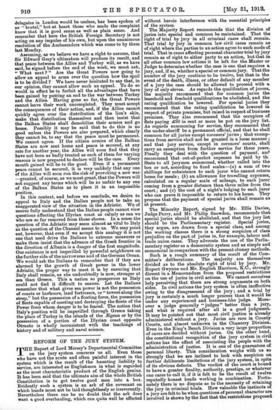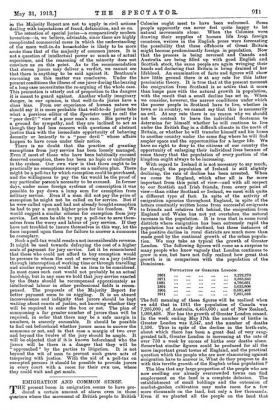REFORM OF THE JURY SYSTEM.
THE Report of Lord Mersey's Departmental Committee on the jury system concerns us all. Even those who have not the acute and often painful interest in the system which is the result of the haunting liability to service, are interested as Englishmen in what is regarded as the most characteristic product of the English genius. It has been said that the ultimate aim of the whole British Constitution is to get twelve good men into a box. Evidently such a system is an ark of the covenant on which hands must not be laid thoughtlessly or irreverently. Nevertheless there can be no doubt that the ark does want a good overhauling, which can quite well be effected without heroic interference with the essential principles of the system.
The Majority Report recommends thit the division of juries into special and common be maintained. That the right of trial by jury in all criminal cases shall remain. That trial by jury in common law civil cases remain as of right where the parties to an action agree to such mode of trial. That in cases affecting personal character trial by jury remain as of right to either party to an action, but that in all other common law actions it be left for the Master or Judge to determine whether the case is one that requires a jury, and, if so, whether a special or common jury. That the number of the jury continue to be twelve, but that in the event of the death, illness, or other default of any member of a jury the case should be allowed to proceed with a. jury of only eleven. As regards the qualification of jurors, the majority recommend that for common juries the leasehold and freehold qualifications be abolished, and the rating qualification be lowered. For special juries they recommend that the rating qualification be lowered in respect of private premises, but raised in respect of business premises. They also recommend that the occupiers of flats paying £30 in rent or more be put on the jury list. As regards summoning for service, they recommend that the under-sheriff be a permanent official, and that he shall summon for all juries except coroners' juries; exemp- tions from service shall not be granted in a oose manner ; and that jury service, except in coroners' courts, shall carry an exemption from further service for three years. Finally they deal with the question of payment, an0 recommend that out-of-pocket expenses be paid by th, State to all jurymen summoned, whether called into the box or not, according to fixed scales—(a) a sum of two shillings for subsistence to each juror who cannot return home for meals ; (b) an allowance for travelling expenses, calculated on a regular scale of mileage, to each juror coming from a greater distance than three miles from the court ; and (c) the cost of a night's lodging to each juror who can prove it impossible to return to his home. They propose that the payment of special juries shall remain as at present.
The Minority Report, signed by Mr. Ellis Davies, Judge Parry, and Mr. Philip Snowden, recommends that special juries should be abolished, and that the jury list should be the Parliamentary register. Special juries, they argue, are drawn from a special class, and among the working classes there is a strong suspicion of class prejudice on the part of juries in, for example, labour and trade union cases. They advocate the use of the Parlia- mentary register as a democratic system and as simple and economical in comparison with the present clumsy methods.
Such is a rough summary of the result of the Com- mittee's deliberations. The majority are themselves divided as to the absolute right of trial by jury. Mr. Rupert Gwynne and Mr. English Harrison, K.C., strongly dissent in a Memorandum from the proposed restrictions on the use of juries in civil actions. We cannot ourselves help perceiving that there are strong arguments on both sides. In civil actions the jury system is often ineffective owing to the disagreement of the jury ; and a trial by jury is certainly a much longer process than it would be under any experienced and business-like judge. More- over a judge generally " judges " better than a jury, and what is required after all is a good judgment. It may be pointed out that most civil justice is already administered without a jury. Juries are rare in County Courts, and almost unknown in the Chancery Division. Even in the King's Bench Division a very large proportion of cases are decided without juries. On the other hand, the constitutional recognition of the jury system in civil actions has the effect of associating the people with the administration of justice. It is one of the guarantees of personal liberty. This consideration weighs with us so strongly that we are inclined to look with suspicion on further deliberate limitations of the jury system, in spite of its obvious defects. The verdict of the court is bound to have a greater finality, authority, prestige, or whatever one cares to call it, if it is felt to be the result of twelve reputedly honest beads working in combination. Fortu- nately there is no dispute as to the necessity of retaining the jury in criminal trials. How valuable the instincts of a jury are felt to be when questions of personal character are involved is shown by the fact that the restrictions proposed in the Majority Report are not to apply in civil actions dealing with imputations of fraud, defamation, and so on. The retention of special juries—a comparatively modern invention—is, we believe, advisable, since there are highly complicated commercial cases in which the understanding of the more well-to-do householder is likely to be more acute than that of the majority of common jurors. It is not a question of intellectual power so much as of actual experience, and the reasoning of the minority does not convince us on this point. As to the recommendation that eleven jurors may deliver a verdict, we cannot see that there is anything to be said against it. Bentham's reasoning on this matter was conclusive. Under the present conditions the illness of one juror• during the hearing of a long case necessitates the re-arguing of the whole case. This precaution is utterly out of proportion to the dangers it is meant to guard against. Another wholly imaginary danger, in our opinion, is that well-to-do juries have a class bias. From our experience of human nature we should say it is more probable that well-to-do juries take what a previous editor of the Spectator used to call the " poor devil! " view of a poor man's case. His poverty is a ground for sympathy, and they are inclined to act as though they had less concern with questions of abstract justice than with the immediate opportunity of behaving decently or leniently to a " poor devil " whose affairs happen to have come under their notice. There is no doubt that the practice of granting exemptions from jury service has been loosely managed. Even if most of those who have been habitually excused deserved exemption, there has been no logic or uniformity in the system. Our own view is that there ought to be practically no exemptions except on a uniform plan. There might be a poll-tax by which exemption could be purchased, and the willingness to pay the tax would be the proof of any particular person's necessity to be excused. In former days, under some foreign systems of conscription it was possible to pay down a lump sum for exemption from military service. Even if a man did not pay the price of exemption he might not be called on for service. But if he were called upon and had not already bought exemption he had to pay a much higher price for his freedom. We would suggest a similar scheme for exemption from jury service. Let men be able to pay a poll-tax to save them- selves from the worry and labour of jury service. If they have not troubled to insure themselves in this way, let the fines imposed upon them for failure to answer a summons be exemplary.
Such a poll-tax would create a not inconsiderable revenue. It might be used towards defraying the cost of a higher scale of payment for jury service. Let it be remembered that those who could not afford to buy exemption would be persons to whom the cost of serving on a jury (either through interruption of working time or through travelling and similar expenses) would be an item to be considered. In most cases such cost would not probably be an actual hardship, but in any case we hold that jury service exacted by the State should be recompensed approximately as intellectual labour in other professional fields is recom- pensed. The proposals of the Majority Report for better payment seem to us niggling. It is an absurd inconvenience and indignity that jurors should be kept waiting about courts of justice, not knowing whether they will be required to enter the box or not. The plan of summoning a far greater number of jurors than will be required, in order that there may be a safe margin in numbers, is scarcely excusable. It should be possible to find out beforehand whether jurors mean to answer the summons or not, and in that case a. margin of two over and beyond the twelve of the jury should be ample. It will be objected that if it is known beforehand who the jurors will be there is a danger that they will be " approached" by the parties to litigation. It is not beyond the wit of man to prevent such grave acts of tampering with justice. With the aid of a poll-tax on exempted persons it should be possible to provide jurors in every court with a room for their own use, where they could wait and get meals.



















































 Previous page
Previous page